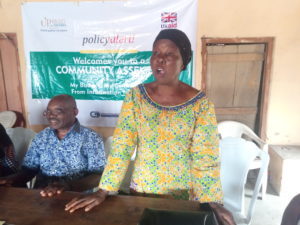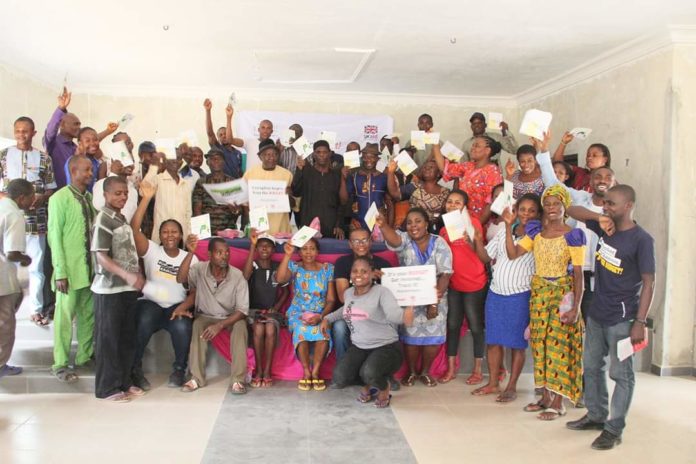Indigenes of Ikot Ikere community in Ibesikpo Asutan endorsing the Upright for Nigeria campaign at a community assembly facilitated by Policy Alert.
By Abasifreke Effiong – Uyo
Communities in Akwa Ibom state have formed a-10 member Citizens Against Corruption Committee to monitor government budgets and projects implementation in Water Sanitation and Hygiene(WASH), taxation and power sector of the state.
Different communities in the state formed the committee in response to a community-based anti-corruption campaign which seeks to encourage citizens’ involvement in budgeting and implementation of government projects.
The 10-member community has been formed in Mkpok, Eket local government and Ikot Ikere (better known as Nung Oku Akpasima) in Ibesikpo Asutan local government area.
READ ALSO : Coronavirus: Unconfirmed report says three Chinese are quarantined in Plateau
The Dune learnt that communities in about 10 other local government areas in the state have already formed the citizens against corruption committee.
The committee will work to ensure that communities have full value for projects sited in their domains, and expose cases of corruption in tax and power sector of the state.
The community-based anti-corruption campaign which prompted the formation of the committees was facilitated by Policy Alert, a non-governmental development organisation working with Actionaid on its anti-corruption programme, Upright for Nigeria.
The campaign which has as its theme, “My budget, my community: From information to action”, sought to let people in the state know projects captured in the budget for their communities and encourage them to be involved actively in their implementation.
READ ALSO : Grading roads in all communities is our dry season priority – Uruan chairman
Introducing the campaign to the people of Mkpok, Eket local government and Ikot Ikere in Ibesikpo Asutan local government at a community assembly, programme lead of Policy Alert, Mr. Faith Paulinus, said the campaign is aimed to encourage citizens to ask questions on what is allocated to them in the budget and how governments’ projects in their communities are implemented.
He said the Freedom of Information Act gives individuals and communities the right to ask questions on budgets implementation in their communities, hence the campaign seeks to help the community-based committees to use the FOI to seek information on what is in for them in the budget.

Paulinus said awareness and involvement of communities in budgeting and implementation of projects will reduce the propensity of corruption in governments’ budgets.
“We have been talking about budget, and Freedom of Information Act which gives everyone the right to ask questions about anything. Today, we here to work with you so that you can ask questions on budget and project implementation in various communities across the state.
“Everyone has the power to ask question about what is in for each community in the budget. We want communities to ask this question and also be interested in monitoring the implementation of government projects in their domain.”
Paulinus said Policy Alert will work with the community-based anti-corruption committees, providing them information on budgets and projects in their respective communities, guide them to raise FOI requests and how to get involved in the implementation of projects in their communities.
Receiving the campaign facilitators in Eket local government area, the acting chairman of Mkpok community, Bishop E. E. Etteh, said members of the community are in support of the initiative.
However, the people of Mkpok community said they desire to collaborate with Policy Alert to end outrageous electricity bills.
Women leader of Mkpok, Deaconess Eno Essien, said the community has felt the harsh impact of corruption in bills forced on them by PHEDC.
 Women leader of Mkpok, Eket local government area, Deaconess Eno Essien, speaking at community assembly.
Women leader of Mkpok, Eket local government area, Deaconess Eno Essien, speaking at community assembly.
“We have seen and suffered corrupt practices in this community. And we are worried that some households are given bills of N15,000 monthly without electricity. They give light about two days a month and mostly few days to the day they want to give bills. And if you don’t pay, the next day, they will come for disconnection. Is that not corruption?”, she asked.
Another woman in the community, Deaconess Comfort Etukudoh, alleged that PHEDC staff were hoarding electricity meters from poor people and selling them at exorbitant prices to people with high purchasing powers while continually giving outrageous estimated bills to poor households.
RELATED STORY No unmetered household should pay electricity bill above N1800 – NERC
A youth leader in Mkpok, Samuel Ben decried that despite having two water projects in the community, none was functional.
He said one of the water projects located at Government Primary School, Mkpok, dug by the Akwa Ibom government has never given the community a drop of water, years after the project was completed.
Ben and other members of the community said access to portable water remained a big challenge to Mkpok.
Access to portable water is also a challenge to the people of Ikot Ikere community, Ibesikpo Asutan local government.
The community’s main source of water which was a stream, has been ravaged by the multi-billion naira drainage project which empties at Obot Idim Ibesikpo, done some years by the state government.
















